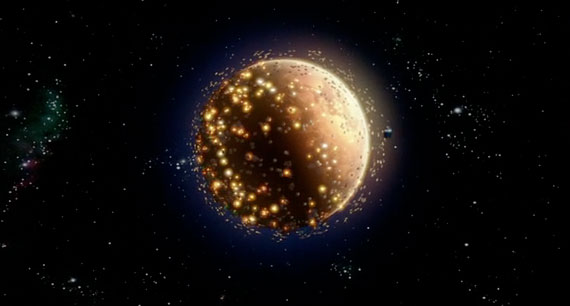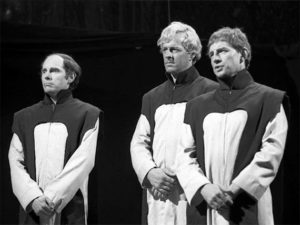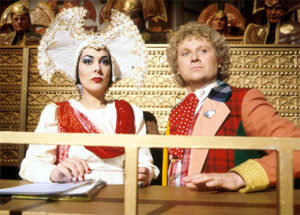The Capaldi Conundrum: Bringing Back the Time Lords
Guest contributor Karim Zidan analyses the potential return of the Time Lords.

On December 25th, 2013, Whovians worldwide said goodbye to a beloved incarnation of the Doctor; one that will be remembered for his uncanny sense of style, boyish charm and complex emotional turbulences amongst other things. Although it may have been a sad moment for most, it culminated with the birth of an entirely new embodiment of the Time Lord, this time in the form of Scottish thespian Peter Capaldi. The latest Doctor has been on our screens for less than 60 seconds in total, yet his emphatic debut will not be forgotten, in part due to the established storyline centered around the likely return of Gallifrey.
The potential return of the enigmatic Time Lord society poses a conundrum for the latest Doctor: whether or not to save his kind from their eternal damnation in an alternate universe. One could assume that the decision is a simple one; why would the Doctor willfully chose to abandon his own race and refuse to rescue them, particularly after they gifted him with an unexpected regeneration (or cycle of regenerations)? The answer is debatable; a thorny dissection that includes a detailed look at the storied history of the Gallifreyan race, their bureaucratic society and where they stand amongst the modern universe, 700+ years after their fall.
To those who watched the classic series, there is a certain familiarity with the Time Lord race. After all, they make dozens of appearances in a wide array of scenarios that helped us determine the inherent nature of these Celestial beings. From court tribunals to war councils, the Time Lords have certainly left behind an illustrious history, albeit chalk-filled with tribulations.
 When we are officially introduced to the Time Lords in The War Games, the final serial of the Second Doctor run on the show, they reveal themselves to be bound by strict policies of non-intervention, ultimately developing into a sort of guardian race dedicated to the ensuring that the laws of time and space are obeyed. This is vastly contrasting to the Doctor’s approach to problem solving, hence we arrive at the first conflict of interest faced when bringing back the Time Lords.
When we are officially introduced to the Time Lords in The War Games, the final serial of the Second Doctor run on the show, they reveal themselves to be bound by strict policies of non-intervention, ultimately developing into a sort of guardian race dedicated to the ensuring that the laws of time and space are obeyed. This is vastly contrasting to the Doctor’s approach to problem solving, hence we arrive at the first conflict of interest faced when bringing back the Time Lords.
This is further elaborated in Jon Pertwee’s era on the show, where we have the opportunity to witness the Time Lords in action, as they banished him to 20th century Earth, occasionally employing him against his will when they required him for particular tasks on other planets. In many ways, he was their personal puppet, strung to perform at their leisure, leading to the development of a somewhat icy relationship between them. Their interactions with the Doctor in his second two incarnations are our first introduction to their authoritarian nature.
The Fourth Doctor also maintained a fair bit of tension with the Time Lords but also had his crowning moment (quite literally) when he was made Lord President of the High Council of Gaillfrey. It was that particular serial, The Deadly Assassin, that also revealed the corruption inlaid in the ancient society, along with the few power- hungry Time Lords that were members of the oligarchy. This was arguably the first time in the history of the show that Gallifreyan’s were presented as far from perfect – riddled with flaws and prone to complications that they were unable to resolve through their rigorous governmental system.
 Jumping forward to the Sixth Doctor’s Era, we got a much deeper sense of their bureaucratic nature during the season-long serial dubbed The Trial of a Time Lord, which featured the Doctor on trial for continuous interference in the affairs of foreign planets. The personification of the bureaucracy came in the form of The Inquisitor, who oversaw the proceedings in the courtroom as the presiding judge. Ultimately, the Doctor prevailed, but it was not without a tedious and turbulent trial.
Jumping forward to the Sixth Doctor’s Era, we got a much deeper sense of their bureaucratic nature during the season-long serial dubbed The Trial of a Time Lord, which featured the Doctor on trial for continuous interference in the affairs of foreign planets. The personification of the bureaucracy came in the form of The Inquisitor, who oversaw the proceedings in the courtroom as the presiding judge. Ultimately, the Doctor prevailed, but it was not without a tedious and turbulent trial.
The classic series aimed to give us the particular visualization of the Time Lords as an ancient, obstinate race buried under the hefty burden of the knowledge of time travel to further facilitate our reasoning as to why the Doctor would want to escape his own planet with a ‘borrowed’ TARDIS. The contrasting characteristics between the Doctor and the vast majority of his race could not have been clearer at the time. While they remained content with overseeing the affairs of the universe from a safe distance, he preferred a far more hands-on approach and was shunned for it. This was later overshadowed when the show returned in 2005, as the Time Lords were represented as a mystical race, shrouded in mystery as well as tragedy; the Doctor added to this perception with his apparent guilt and sadness over their demise. Had one started watching Doctor Who during that period, it would be hard not to grow fond and somewhat curious over the Gallifreyans and the Doctor’s emotional recollection of them.
 The Time Lords were later resurrected (if only temporarily) in David Tennant’s swansong as the Doctor, The End of Time, where show runner Russell T Davies took an interesting, if not controversial approach to explaining the end of the Time War. After countless years engulfed in warfare against the Daleks, the Time Lords, led by Rassilon, had grown so desperate and hopeless, that they sought to end time itself to free themselves from their physical forms, at the cost of the remainder of the universe. During the two-part send-off that concluded Tennant’s run on the show, modern Whovians got their first glimpse at a once-proud race gone mad with despair; a sign that their return to the known universe could mark a dark day indeed.
The Time Lords were later resurrected (if only temporarily) in David Tennant’s swansong as the Doctor, The End of Time, where show runner Russell T Davies took an interesting, if not controversial approach to explaining the end of the Time War. After countless years engulfed in warfare against the Daleks, the Time Lords, led by Rassilon, had grown so desperate and hopeless, that they sought to end time itself to free themselves from their physical forms, at the cost of the remainder of the universe. During the two-part send-off that concluded Tennant’s run on the show, modern Whovians got their first glimpse at a once-proud race gone mad with despair; a sign that their return to the known universe could mark a dark day indeed.
This leads us to what I have dubbed the Capaldi Conundrum: Should the latest incarnation of the Doctor bring back the Time Lords even though they have caused him nothing but grief for the majority of his life? While the Doctor may be a Time Lord himself, he never appeared to have gotten along with them, and even refused to join The Time War until there was no alternative, as was shown in Paul McGann’s return for Night of the Doctor.
Now I am well aware that the storyline Davies pursued during the end of his run does not necessarily flow with Moffat’s latest adaptation involving the Time Lords, as Smith’s Doctor did not seem to even consider the events that occurred in The End of Time and was positively overjoyed with the idea of rediscovering his home planet. This could likely mean that we should take the scattered history of Gallifrey with a grain of salt and not with meticulous detail.
The Doctor was subjected to extortion, torture, trials and a fair bit of grief at the hands of the Time Lords. While many of these isolated incidents will likely not be brought up in the upcoming seasons of the show, it is important to analyze the consequences that come with the Doctor’s decision. Who knows, if Moffat decides to pursue the quest for Gallifrey in the near future, these prior events may be taken into consideration and could become the catalyst for an entirely new internal conflict within our beloved Doctor. This could present Capaldi with a fantastic opportunity to separate himself from his previous incarnations. While I am certain he is capable of carving his own personality, a complex storyline and internal struggle such as this could prove to be the spark necessary to cement his character for years to come.








